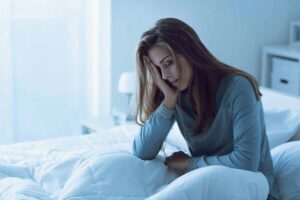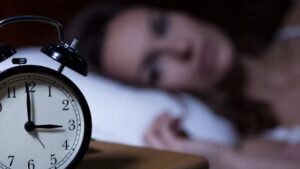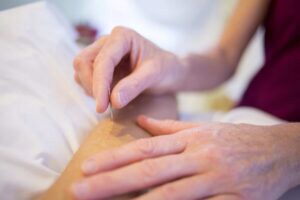Sleep and Alcohol
Disclosure: By clicking on the product links in this article, Mattress Nerd may receive a commission fee at no cost to you, the reader. Read full disclosure statement.
Ahhh … a nice nightcap before bedtime sounds lovely, doesn’t it? But before you grab the snifter and settle in for a good night’s sleep, you should know that that late night cocktail might ultimately demolish your sleep.
“People often think that alcohol helps with sleep because you may fall asleep more quickly. However, the truth is that the quality of the sleep you get using alcohol is far worse than falling asleep naturally, particularly in the second half of the night,” says Aaron Weiner, PhD, a board-certified and licensed clinical psychologist and addictions treatment specialist near Chicago. “Specifically, alcohol reduces REM sleep, which is critical to the body’s ability to recharge and refresh. The more someone drinks, the worse the result.”
A review of all known scientific studies on the effects of alcohol on sleep, published in the journal Alcoholism: Clinical & Experimental Research, confirmed that alcohol acts as a depressant and sedative and shortens the time it takes to fall asleep. But it also decreases deep sleep and reduces REM sleep. What that translates to is that over-imbibing knocks you out but limits restorative REM sleep. Then it forces you awake in the middle of the night and prevents you from falling back to sleep. When you do rise for the day, chances are you will feel exhausted.
When you are in an alcohol-induced sleep, there’s also a good chance your sleep won’t be of much quality considering the alcohol is putting you at increased risk of snoring and sleep apnea, not to mention, “the extra fluids may cause you to wake in order to go to the bathroom,” Dr. Weiner says.
Just how bad is that nightcap you’re craving, and is it really worth forgoing for a good night’s sleep? Let’s take a closer look at the architecture of healthy sleep, what happens to sleep when alcohol is consumed, and alternatives to cocktails to help you wind down at the end of the day.
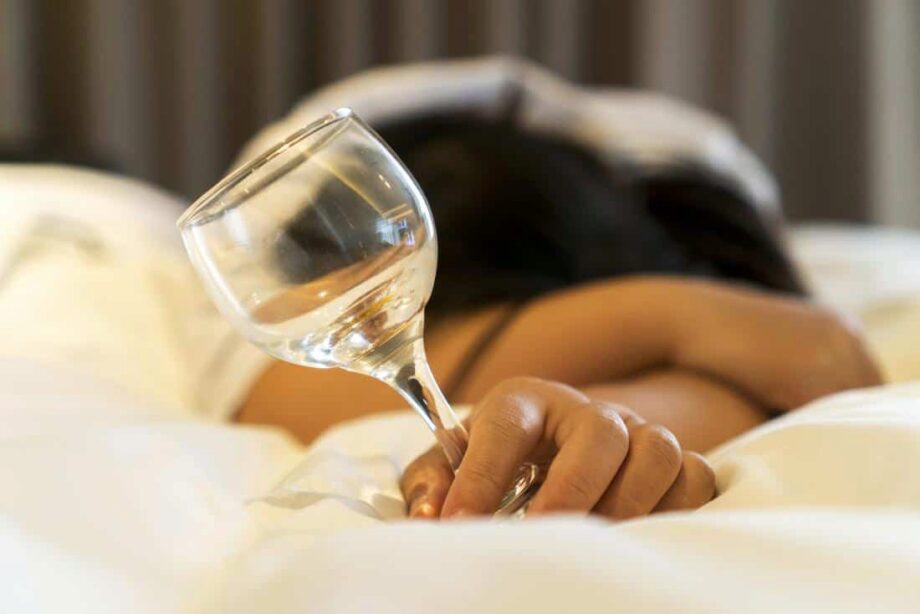
How Alcohol Affects the Stages of Sleep
A good night’s sleep is vital to our emotional, physical, and mental wellbeing. Not only does it keep you alert and your mind sharp during the day, getting plenty of sleep helps prevent heart disease, high blood pressure, diabetes, and even dementia. There are two basic types of sleep — REM (rapid eye movement) sleep and non-REM sleep. Each is identified by different brainwaves and neuronal activity. Normally, each of us cycles through all stages of REM and non-REM sleep several times a night with REM growing increasingly longer and deeper with each cycle. What happens to sleep when you have that nightcap or two … or three? Let’s take a look:
- Stage 1: This first stage of sleep occurs when you enter into a relaxed wakefulness and begin to fall asleep. Your body temperature drops and your heart rate begins to slow. Your brain produces alpha waves, which are low frequency waves that become synchronized as you begin to relax. Your brain also starts producing sleep spindles, bursts of neural activity that help guide you into deep sleep.
- Stage 2: Soon after the first stage of sleep, you drift into a light sleep. Your brain becomes totally relaxed and begins producing slow, rhythmic delta waves. This is when alcohol begins wreaking havoc on sleep because it causes your brain to throw out alpha waves which takes you back to Stage 1.
- Stage 3: When you make it past Stage 2, you enter into deep sleep or slow-wave sleep. Those delta waves increase and you prepare for REM sleep. But if you’ve knocked back a few too many drinks, you may not even get to this stage of sleep until the alcohol works itself out of your bloodstream.
- Stage 4: Following Stage 3 sleep is REM sleep, the most important type of sleep you can get. This is the sleep stage during which you do most of your dreaming. If you get a full 8 hours of Zzzzs, then you can expect to collect an hour or two of REM sleep as you cycle through the stages of sleep at night. REM sleep is also when the brain stores and sorts memories, bodily tissues are repaired, and proteins are produced. Without enough REM sleep your mind and body suffer. Plus, you wake feeling pretty crappy.
The Connection between Alcohol and Different Sleep Disorders
Not only does alcohol interfere with restorative REM sleep, it also increases the likelihood of snoring and sleep disorders.
Obstructive Sleep Apnea
Sleep apnea, also called obstructive sleep apnea or OSA, is a potentially serious sleep disorder in which breathing repeatedly stops and restarts, disrupting sleep. Sleep apnea is caused when the tissues in the mouth fall to the back of the throat and obstruct the airway.
“Alcohol exacerbates the risk of sleep apnea because it inhibits your body’s ability to breathe while sleeping,” says Dr. Chun Tang, a general practitioner in Manchester City, U.K. “Alcohol not only relaxes you, but it also relaxes the muscles in your throat making it more likely for the upper airway to collapse, causing snoring or sleep apnea.”
Insomnia
Alcohol and insomnia are common bedfellows. Insomnia is a sleep disorder in which you have difficulty falling asleep at night or wake at night and have trouble falling back asleep. There are a few different types of insomnia.
- Primary insomnia: The inability to fall asleep or stay asleep that is not caused by lifestyle habits or a medical or psychiatric cause.
- Secondary insomnia: The inability to fall asleep or stay asleep due to an emotional, neurological, or other medical or sleep disorder.
- Chronic insomnia: Long-term difficulty falling asleep, such as several nights a week for a month or longer.
- Acute insomnia: Short-term insomnia that can last from a few days to a few weeks. Acute insomnia is the most common type of insomnia, and it is often caused by a stressful event, such as the loss of a loved one.
Some people pour a nightcap before bedtime to take advantage of its sedative effects. And yes, a stiff drink can help you fall asleep faster. But the alcohol will prevent you from getting enough restorative REM sleep and deep sleep, and you will likely awaken in the middle of the night unable to fall back asleep. Those who regularly imbibe will likely develop insomnia.
Hyperhidrosis
Sweating is the body’s way of releasing heat to maintain optimal body temperature. Abnormally excessive sweating — so much that it soaks through your clothes and drips off your body — is called hyperhidrosis. If you suffer from this condition, or if you are going through menopause and experience hot flashes, alcohol can make your sweating worse, especially at night.
Alcohol can trigger night sweats by causing the heart to beat faster or beat irregularly. When the heart rate increases, the blood vessels in the skin widen, a process called vasodilation. This can cause you to feel warm, become flushed, and begin to sweat.
Nocturia
Waking during the night to urinate, or nocturia, has several causes — high fluid intake, sleep disorders, or bladder obstruction. But it can also be caused — or worsened — by too much alcohol intake. If you suffer from nocturia, you may want to forgo booze, especially before bedtime. Alcohol is a diuretic, a substance that causes you to produce more urine so you pee more.
And since booze is acidic, it can also increase the acidity of your urine and irritate the lining of your bladder. If this happens, it can cause pain and discomfort, especially if you’re prone to urinary tract infections or experience urge incontinence.
Healthier Alternatives for Better Sleep
If you struggle to fall asleep without a nightcap, consider some healthier alternatives. Products such as herbal supplements or improving your sleep hygiene can help you get a good night’s sleep.
The Benefits of Natural Sleep Aids
“I would discourage patients from relying on prescription sleep aid medicine, such as Ambien and Xanax,” suggests Sal Raichbach, PsyD, LCSW, CFSW, Director of Clinical Services at Ambrosia Treatment Center in West Palm Beach, Florida. “These insomnia sleep aids are habit-forming.” Instead, consider trying natural sleep aids.
Melatonin: Melatonin is the body’s natural sleep hormone that’s produced in response to darkness. It helps your circadian rhythm stay in sync. Melatonin is also available as a dietary supplement.
Lavender: The soothing scent of lavender is often used in essential oils and bath soaps to promote sleep. It’s also available in supplement form to help reduce anxiety and bring a sense of calm so you can fall asleep.
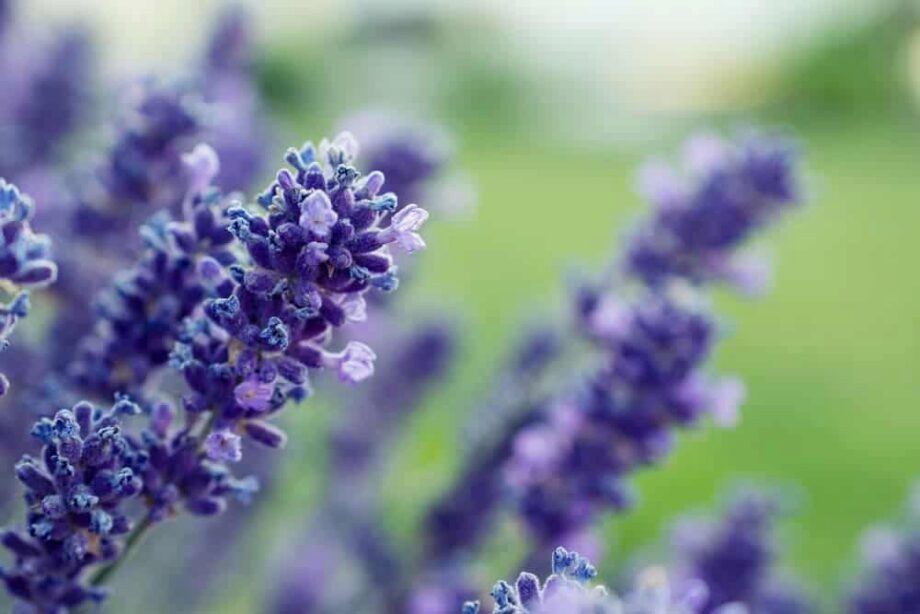
Magnesium: Magnesium is a mineral that is crucial to many of the body’s functions, including promoting regular blood pressure, improving bone strength, and regulating heart rhythm. It also helps relieve anxiety and depression so you can sleep better.
Chamomile: Chamomile is known as a mild tranquilizer, anxiety tamer, and sleep inducer, and is often found in tea. It’s also available in supplement form.
Practice Good Sleep Hygiene
Sleep hygiene is the behavioral and environmental practice that impacts the quality of your sleep. Improving your sleep hygiene can vastly improve your sleep. Here are some suggestions for how you can improve your sleep hygiene.
Establish bedtime routine: Bedtime routines are often used to help young children wind down before bedtime. But they’re also a good idea for adults. About 30 minutes before bedtime, turn off the electronics, take a warm bath, and read or meditate to help you wind down so you can fall asleep.
Take a warm bath: “A warm bath before bedtime will do wonders,” confirms Chris Norris, certified sleep science coach and founder at Sleep Standards. “It will make your body calm and relaxed, which makes you fall asleep faster.”
Consistent sleep schedule: Setting a regular bedtime and wake up time can help regulate your circadian rhythm so falling asleep and waking up becomes easier and more natural.
Bedroom environment: Your bedroom should be conducive to sleep. “Just identify what makes you calm and peaceful,” Dr. Raichbach says. Keep your room dark and cool, remove any distracting lights and, if you’re prone to anxiety, “add a weighted blanket,” he suggests. “It’s highly comforting to patients and reduces restlessness and anxious feelings in most.”
Avoid blue light close to bed: Blue light is what’s emitted from all those electronic devices you love — your cell phone, TV, laptop. Blue light helps keep you alert, which is great when you want to catch up with friends on Instagram or finish that movie on TV. But it’s not so great when you’re trying to go to sleep. Try unplugging from electronics about 30 minutes before bedtime so the blue light effect doesn’t keep you awake.
Relaxation exercises or meditation: “If you’re using alcohol to shut off an anxious mind, try sleep meditations instead,” Dr. Weiner says. “It’s less expensive, non-addictive, and preserves your ability to get the best rest possible throughout your entire night’s sleep.” He recommends using an app to guide you, such as Headspace, Calm, and Balance. These apps only require you to listen, rather than stare at your phone, so the blue light shouldn’t be an issue.
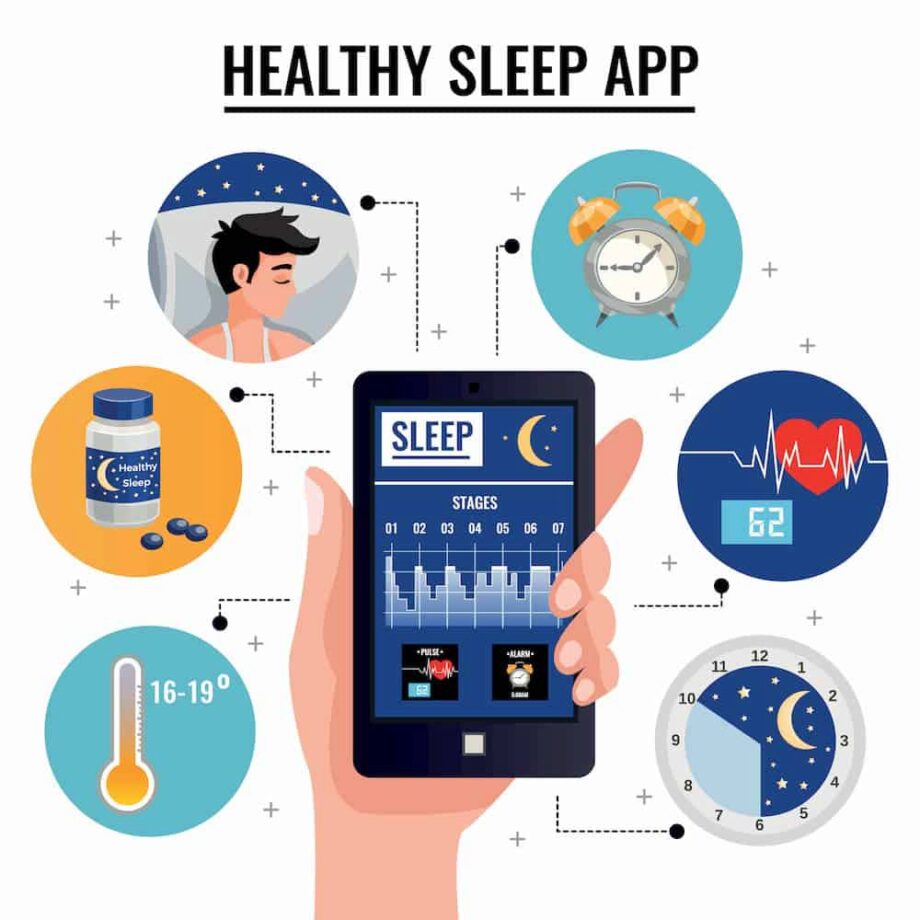
New mattress and breathable sheets: You may not realize how sagging and unsupportive your current mattress is until you get a new one. New mattresses made with memory foam or latex, or a hybrid with foam and innerspring, can offer comfort as well as performance features such as spinal alignment and pressure point relief. This can reduce aches and pains so you sleep better. Top your new mattress off with a fresh set of sheets for extra comfort.
Avoid other stimulants like nicotine and caffeine: Cut out stimulants like caffeine and nicotine a few hours before bedtime or else you may lie in bed for a while before sleep comes. Caffeine is also a diuretic, which means drinking that sugary soda too close to bedtime may have you making frequent trips to the bathroom as well.
Exercise at appropriate times: Exercise is great for sleep. It works out excess energy and anxiety so you sleep better at night. But it also releases endorphins, the “feel good” hormone, that can interfere with sleep if you workout too close to bedtime.
Final Thoughts
A nightcap before bedtime can help you destress and wind down. But too many drinks before you head off to bed can wreak havoc on your sleep. There are healthier alternatives to put your mind at ease and help you fall asleep — and stay asleep — so you can wake feeling rested.
“But, if you’re struggling to sleep without alcohol or feel that alcohol usage has become a problem for you,” Dr. Tang cautions, “please contact your general practitioner or an alcohol helpline for support and guidance.”
For free and confidential help within the United States, call the Substance Abuse and Mental Health Services Administration’s National Helpline at 1-800- 662-4357.
